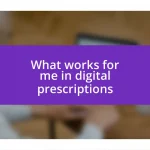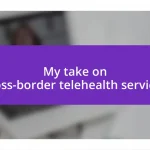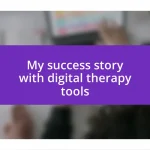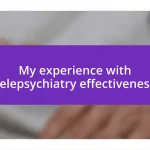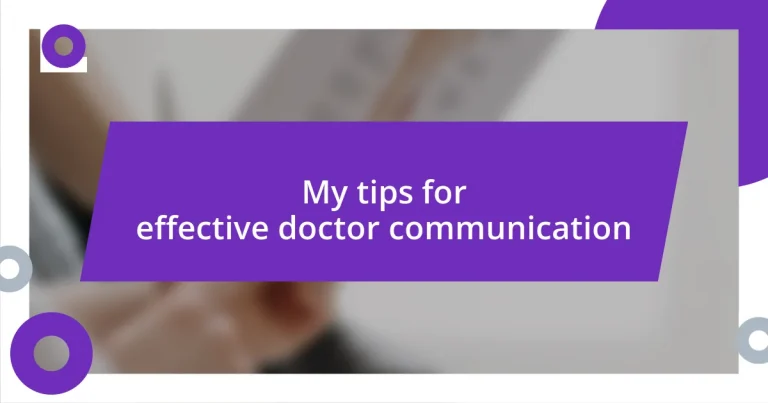Key takeaways:
- Different communication styles among doctors can significantly affect patient experiences; collaborative approaches boost patient confidence.
- Preparation for appointments, like jotting down symptoms and being open, enhances communication and aids accurate diagnosis.
- Utilizing technology, such as patient portals and telemedicine, improves communication with healthcare providers, making interactions more efficient and accessible.
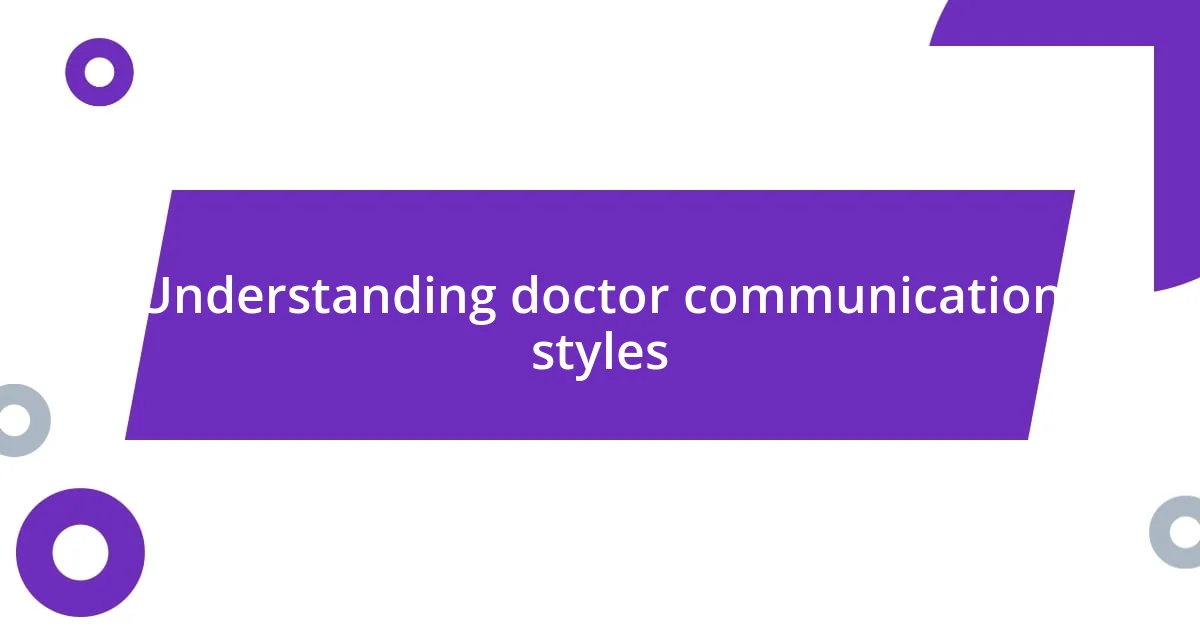
Understanding doctor communication styles
When I think about doctor communication styles, I remember my first visit to a new physician. Their approach was very methodical, as if they were following a carefully scripted protocol. It made me feel like just another case file instead of a human being with unique concerns. Have you ever experienced a similar situation? It’s surprising how much the style of communication can affect our feelings about care.
Different doctors have varying approaches to communication, often influenced by their training and personality. Some doctors lean towards a more paternalistic style, where they guide the patient through decisions, while others are more collaborative, encouraging shared decision-making. I’ve found that when a doctor actively seeks my input, it boosts my confidence in the treatment process. I wonder how much better our health care experiences could be if more doctors adopted that collaborative stance.
Then there are those moments when a doctor’s quick, jargon-filled explanations leave me feeling overwhelmed rather than informed. I recall a time when I was left puzzled by terms like “hypertension” without any clarity. It’s essential for doctors to adjust their communication based on the individual’s understanding. After all, shouldn’t our health information be empowering rather than confusing? Each doctor’s style can majorly impact how we perceive and manage our health.
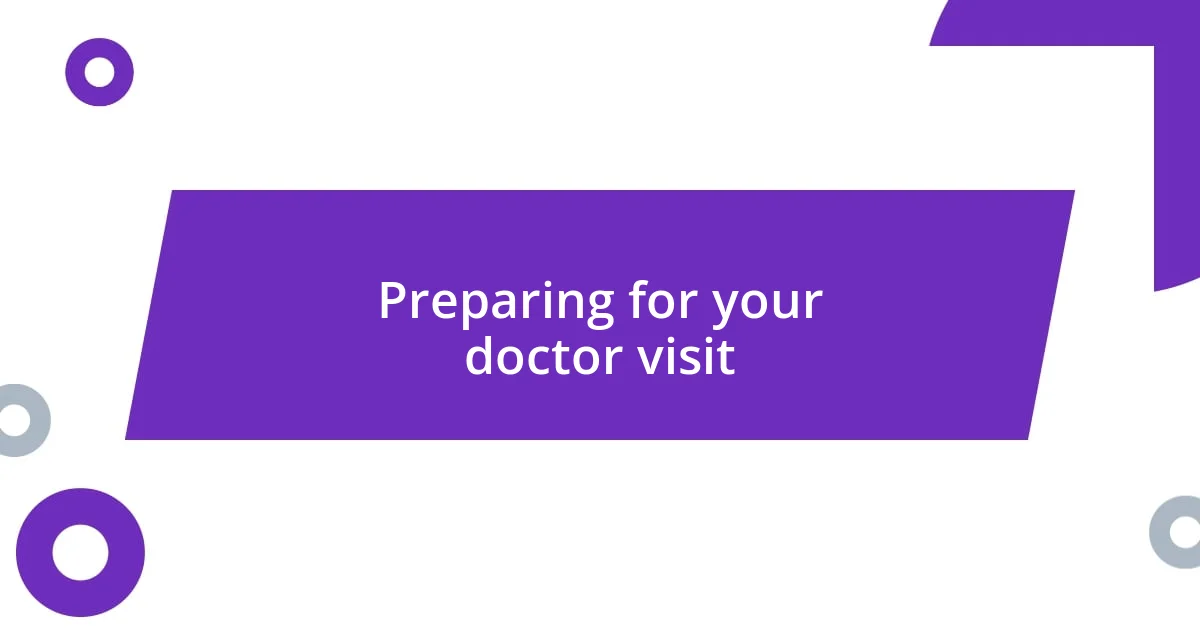
Preparing for your doctor visit
When I’m getting ready for a doctor visit, I usually take a moment to jot down my symptoms and questions. The last time I visited a specialist, I felt so much more at ease because I had written everything down beforehand, including specific episodes of discomfort. Believe me, it can make a huge difference when you’re sitting in that office and your mind suddenly goes blank.
I also find it beneficial to gather any necessary medical records or reports prior to the appointment. On one occasion, I had trouble recalling the names of medications I was taking, and it really hindered the conversation. Bringing along a list not only saves time but also ensures that my healthcare provider has all the information needed to make informed decisions.
Lastly, I like to remind myself to be open and honest during the consultation. I remember one visit where I hesitated to mention a minor symptom, thinking it wasn’t important. Turns out, that detail was relevant to my diagnosis! It’s always better to share everything, even if it seems trivial, to foster effective communication.
| Preparation Step | Benefits |
|---|---|
| Jotting down symptoms and questions | Helps articulate concerns clearly |
| Gathering medical records | Ensures all relevant information is available |
| Being open and honest | Enhances communication and aids in proper diagnosis |
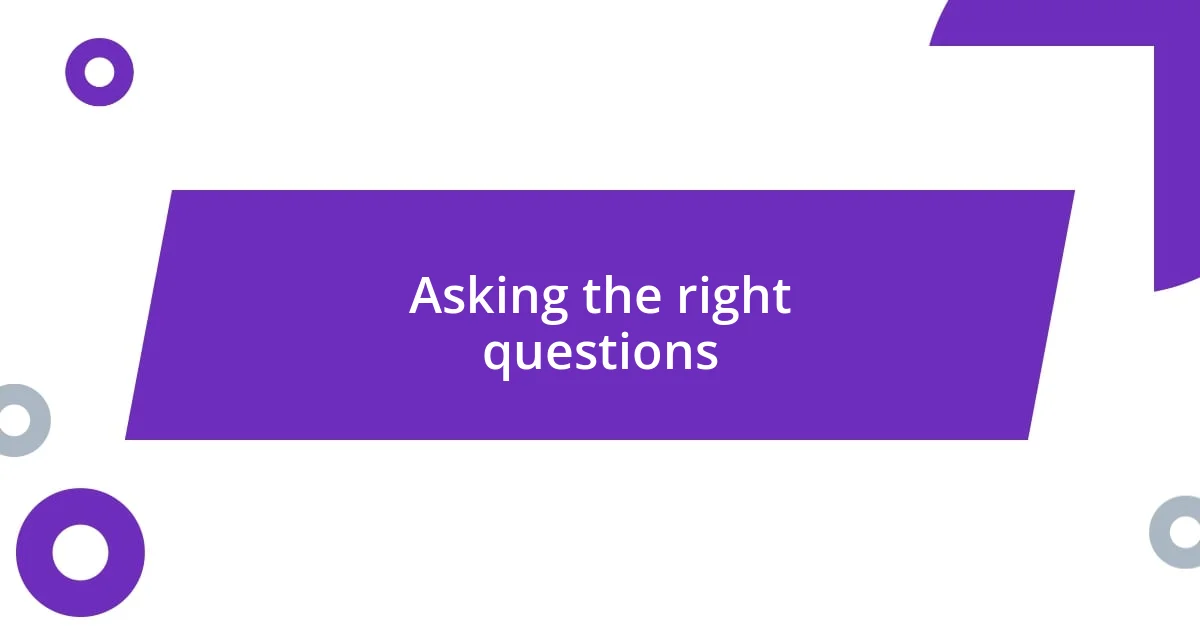
Asking the right questions
When it comes to effective doctor communication, asking the right questions is paramount. I vividly remember an appointment where I hesitated to ask about a potential side effect of a new medication. That nagging uncertainty lingered with me, impacting my overall sense of security about the treatment. Learning to be proactive in questioning not only clarifies doubts but can also uncover vital insights about one’s health journey.
To ensure you’re asking the most relevant questions during your appointment, consider these prompts:
- What are the potential side effects of this medication?
- Can you explain the results of my tests in simple terms?
- What lifestyle changes can I make to improve my condition?
- How does this treatment compare to other available options?
- What should I expect during the recovery process?
By integrating these questions into my conversations with healthcare providers, I’ve felt more empowered and engaged in my own care. Each question creates an opportunity for clarity and understanding, transforming what could be an intimidating experience into a collaborative dialogue.
Another valuable aspect of asking the right questions is understanding treatment options thoroughly. I recall a time when I learned about a less invasive procedure after directly asking my doctor if there were alternatives to the suggested surgery. That immediate response changed my perspective and calmed my anxiety. Sometimes, simply prompting your doctor for all available choices can significantly shift your entire care journey.
Here are some additional questions I find beneficial:
- What are the risks and benefits of this procedure?
- How will you monitor my progress after treatment?
- Are there support groups or resources I can access?
- What is the expected timeline for recovery and follow-up?
In my experience, these inquiries not only enhance communication but also build trust with my healthcare provider. Ultimately, being inquisitive helps us take charge of our health and fosters a more meaningful connection between doctor and patient.
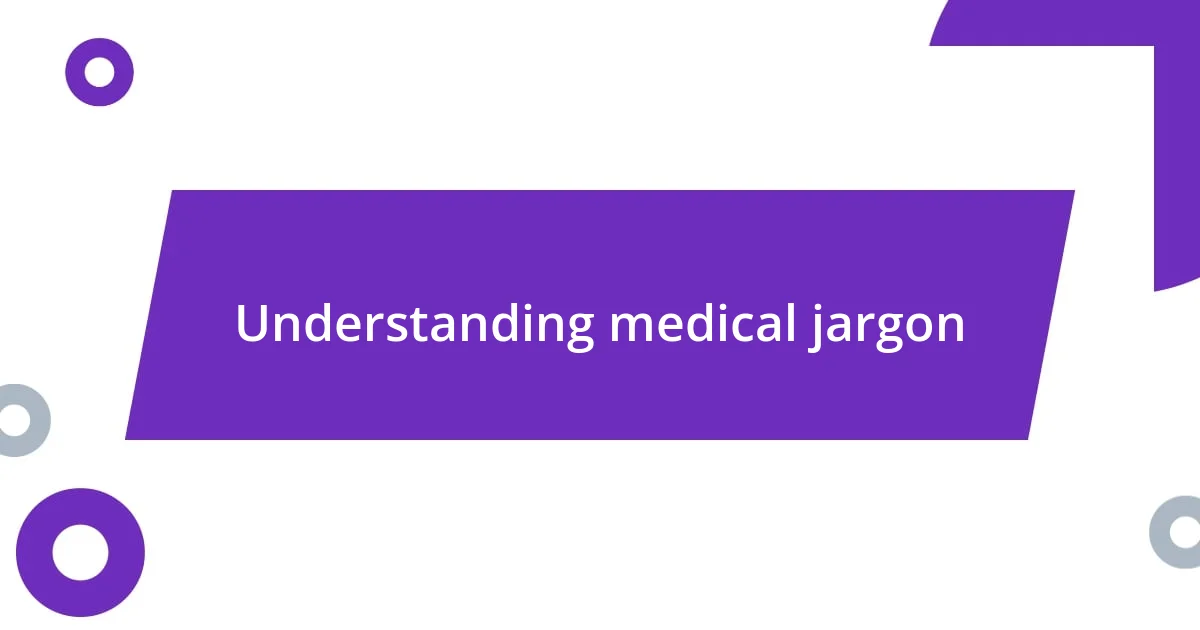
Understanding medical jargon
Understanding medical jargon is a crucial part of effective doctor communication. I remember my first encounter with terms like “hypertension” and “comorbidities.” It felt daunting, like trying to decode a foreign language. When I later asked my doctor to explain these terms in simpler language, it was a revelation. Suddenly, I had a clearer picture of my health, and I felt much more engaged in the discussion.
It’s easy to get lost in the details of medical terminology during appointments. I’ve learned that if something isn’t clear, it’s perfectly okay to ask for clarification. The first time I requested my doctor to break down the meaning of lab results, I felt silly at first. However, the sense of relief that followed when I actually understood what the numbers meant was incredible. It made me wonder: if a word or phrase seems too complicated, why not ask? After all, it’s my health that’s on the line.
Asking questions about confusing jargon has not only empowered me but also fostered a stronger relationship with my healthcare provider. When I expressed my struggle with the medical terms, my doctor began to make more of an effort to communicate in ways that resonated with me. This experience taught me that effective communication is a two-way street; seeking to understand not only benefits me but also guides healthcare providers to cater to each patient’s unique needs.
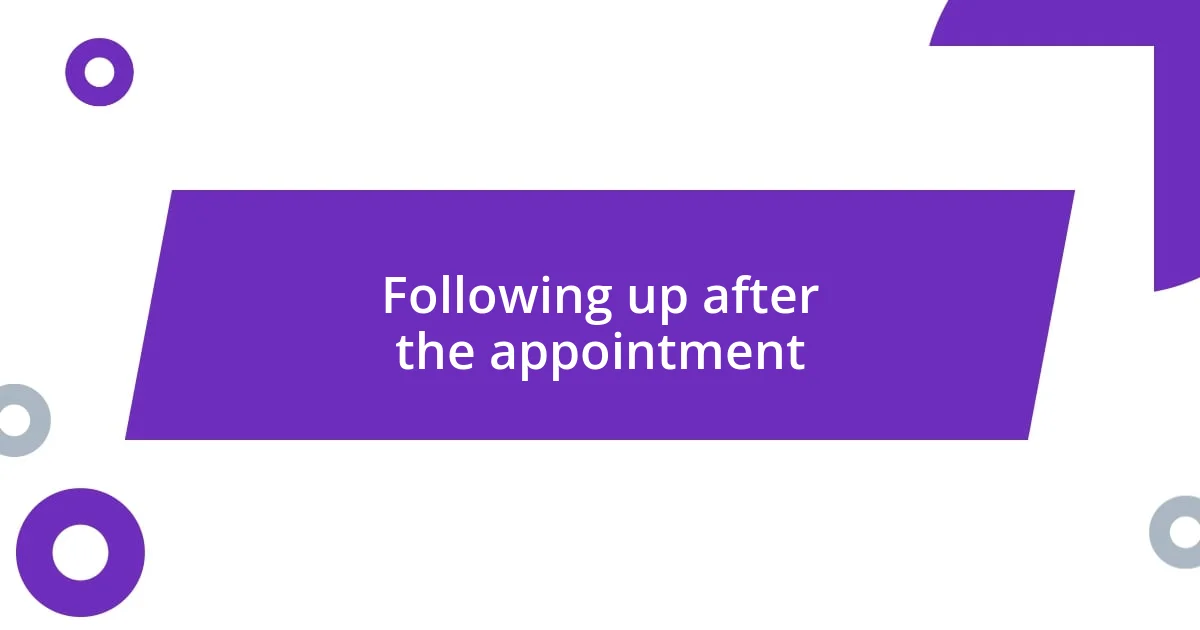
Following up after the appointment
Following up after an appointment is often just as crucial as the visit itself. I remember leaving a doctor’s office once, still pondering a conversation about my treatment plan. A couple of days later, I felt it was important to reach out for clarification on a few points that had nagged at me. I was surprised by how much more empowered I felt after getting those answers.
When I do follow up, I tend to use a straightforward approach: a quick email or a call summarizing my queries. This not only reinforces my understanding but also opens the door for any updates that my doctor might have regarding my health. I often ask, “Is there anything new I should be aware of since our last discussion?” This simple question can lead to valuable insights that might influence my decisions going forward.
Every time I follow up, I’m reminded how proactive communication helps me foster that trust with my healthcare provider. It’s a two-way street—every detail I clarify not only strengthens my knowledge but also makes my doctors realize I’m an active participant in my care. Have you ever felt that sense of closure just from a simple follow-up? I know I have, and it’s incredibly satisfying.
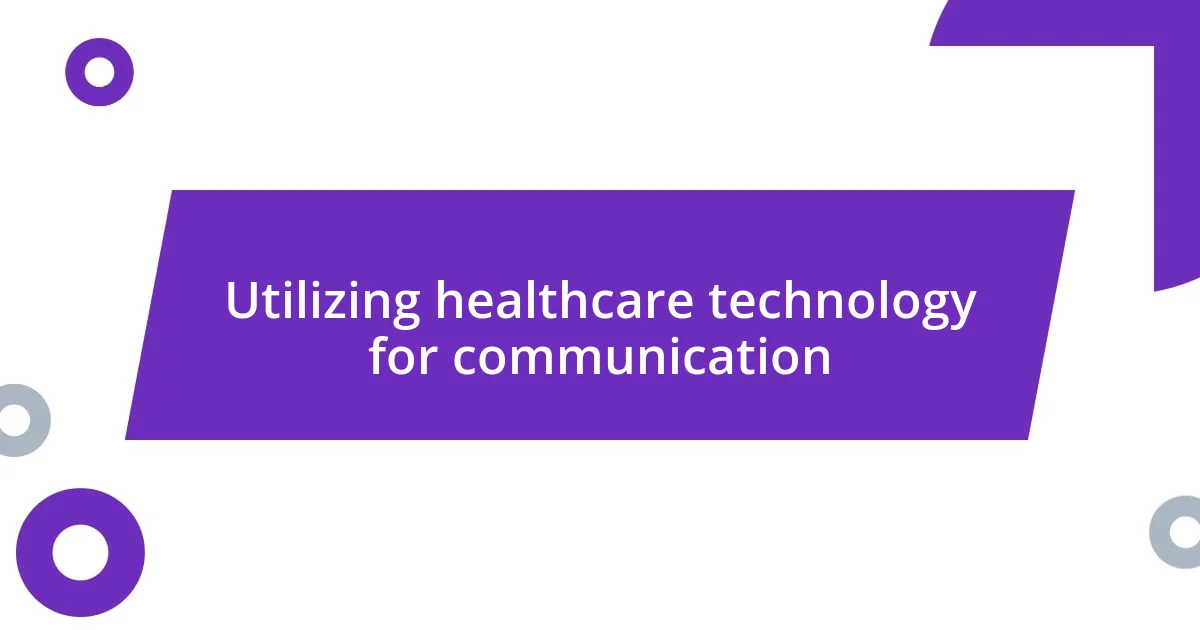
Utilizing healthcare technology for communication
Leveraging healthcare technology can dramatically enhance communication with doctors. I vividly recall my experience with a patient portal—a secure online platform where I could access my health records and communicate with my provider directly. At first, I felt unsure about using it, but once I sent my first message asking a health-related question, I felt a wave of relief. It was like having a direct line to my doctor while sitting comfortably at home. Have you ever found yourself hesitant to reach out? Technology can dissolve those barriers.
Additionally, the use of telemedicine has redefined my interactions with healthcare providers. I remember an instance when I had a minor health concern but didn’t have the energy to travel to the office. A simple video call allowed me to discuss my issue from the comfort of my couch. It struck me how convenient it was to receive care without the stress of logistics. Relying on technology made me feel more in control of my health journey.
Lastly, apps that track medication schedules or symptoms can serve as effective communication tools too. For example, I recently started using an app to document my medication adherence. When I shared the data with my doctor during our appointment, we had a more productive discussion about my treatment. It made me wonder: what if every patient utilized these tools? I believe our healthcare experiences would transform significantly.


